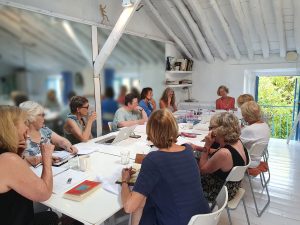Finca Writing in March and June 2024
 Two writing groups came to the Finca in 2024, and we explored a range of subjects including life-writing and emotion – in fiction and non-fiction, internal balance and structure in fiction, writing a synopsis and a pitch, and collaborating in small groups to plot and write a short story. We also had a book-club session.
Two writing groups came to the Finca in 2024, and we explored a range of subjects including life-writing and emotion – in fiction and non-fiction, internal balance and structure in fiction, writing a synopsis and a pitch, and collaborating in small groups to plot and write a short story. We also had a book-club session.
The writers also continued with their own works in progress and/or hopefully were inspired by some of our morning writing exercises into some pieces of new writing.
I like to stress that this is a writing holiday with plenty of me-time in a gorgeous setting (see https://hotelfinca.com/) and how participants choose to spend that time is completely down to them. Some people spent a lot of time writing, others went out walking (in March) and others caught up with some much-needed R&R around the pool (in June).
As always, the food and ambience were superb and everyone seemed to have a good and productive time.
There are two writing holidays booked in for March and June 2025. The March one is full at the moment, but I will be opening the June writing holiday up for bookings in August. E-mail me for details if you are interested…
writing holiday up for bookings in August. E-mail me for details if you are interested…

My Spring Fiction 2024
The Lake House by Kate Morton ***+
Who doesn’t love climbing into a Kate Morton novel? This complex family drama wraps itself around you like a cosy cashmere blanket, enveloping you in deep emotions and an intriguing mystery… (and as I’m writing this, it may be spring but I still need a cashmere blanket…)
Sadie, a detective taking time out for getting too personally involved in a case, discovers a derelict old house and garden in Cornwall, while out for a run one day. The house is Loeannath, the Lake House, and it is the centre of a seventy-year-old mystery surrounding the disappearance of a baby, Theo Edevane. Since Sadie has time on her hands, she decides to investigate further…
In London, Alice Edevane, the famous crime writer and sister of Theo, is shocked to receive a letter from Sadie, asking about the family tragedy. It brings back memories and sensations that she has tried all her life to put behind her. She ignores the letter at first, but Sadie is determined. It becomes clear that there are many family secrets to uncover before the mystery can be solved and the truth revealed.
Who knew more about Theo’s disappearance than they told the police at the time? Flashback chapters from other characters (including the deceased) provide more information, but no body was ever discovered and so Theo might be (still) alive or dead.
There are plenty of twists and turns in this story and I particularly warmed to Alice, whose viewpoint is both insightful and amusing. The author takes the opportunity of having a lot of fun by delving into the writer’s viewpoint. She is also very good at the slow reveal and build up of tension. A multi-layered and enjoyable read.
The Dubrovnik Book Club by Eva Glynn ***+
The Dubrovnik Book Club is a warm and compelling story filled with sensory detail and emotion.
Claire is just starting a new job as manager at the Welcoming Book Shop in Dubrovnik, but this requires huge bravery on her part as she recently suffered from Long Covid and is terrified of getting it again. In the bookshop, she meets Luna, her new colleague – who is struggling to admit her own sexuality to the world.
Claire and Luna start up a Bookclub and through this we meet a cast of other fascinating characters, some of whom also have a difficult journey to go on. The story is very strong on these character journeys, which are handled with sensitivity and perception.
When the Bookshop is threatened, the characters all work together to try to save it. In the meantime, they are all getting to know one another rather better – the relationships between them are well-drawn and convincing.
The setting of Dubrovnik is impeccably researched with great precision of detail (especially on food – yum yum) and the author’s love of the city shines through. A very enjoyable read and highly recommended.
The Keeper Of Stories by Sally Page **** and my Book of the Season
Janice is a cleaner – but also a collector of stories and a storyteller herself. She likes to find evidence of the extraordinary in ordinary people and this gives her some hope of happier endings. Most of her stories come from people she cleans for, some from conversations she overhears on the bus – where she also comes across a very nice bus-driver who happens to look like a geography teacher. (A nice touch, I thought).
Janice is married to the awful Mike and it soon emerges that this is only part of her story. But Janice does not want to tell her story – she feels too guilty – and it takes the support of friends and family plus a set of extraordinary circumstances to persuade her to do so. But if we cannot acknowledge our own stories, how can we hope to move on?
This is a brilliant story about loss, friendship and support. It’s so well-written with plenty of humour, and I loved it.
The New Wife JP Delaney ***+
As always, JPD launches us into the story from the off – direct and straight into the voice of our narrator, Finn. Finn and his sister Jess have just learnt about the death of their father (the Old Bastard) which is no great loss to them as he has never been much of a father to them in the first place. The difficulty is though, that their legacy is the rather glorious Finca Sequia in Mallorca, currently occupied by their father’s third wife Ruensa and her daughter Roze. So Finn goes over to check them out (and maybe throw them out) and from therein becomes embroiled.
To avoid spoilers, let’s just say that this is another twisty tale with plenty going on and a surprising jolt in almost every chapter. As usual, I was hooked from the start, and found it hard to put the book down. Five stars for page-turnability, but I haven’t yet decided how I feel about the ending. Perhaps you should read it and decide for yourself?
Secret Lives by Diane Chamberlain ***+
Eden Rily, movie star, needs time out from ‘wearing a mask’ (as she describes the business of acting) and she decides to write the screenplay for a film about her late mother, successful children’s author Kate Swift. She knows already that her mother, who died when Eden was a young girl, was solitary, possibly agoraphobic and was known as an eccentric. But what else might she discover?
Eden goes to stay with her uncle Kyle and her aunt Lou in her mother’s old home town, in order to find out more. But it isn’t easy for Eden being with them. She had a difficult childhood which included a spell in an orphanage and she feels guilty around Lou – who is wheelchair bound – because of an accident which she feels is her fault.
The story takes on an added thread when we hear Kate Swift’s voice through the journals which she kept at the time, and which Eden is now reading. There are a lot more dark secrets to her mother’s life than Eden had realised, some of which have a huge impact on Eden’s life and relationships now. And then Eden meets Ben Alexander, an archaeologist friend of Kyle’s who has more dark secrets of his own.
Will Eden be able to continue with her plan to write the screen play of her mother’s life – or will it be too emotional and intense for her to contemplate? And can she find her own sense of self by discovering the truth about her mother’s past? I very much enjoyed this novel and highly recommend.
The Silence of The Girls by Pat Barker ****
In this re-telling of ‘The Iliad’, the main narrative voice is that of Briseis, taken prisoner when her city falls to the Greeks and given to Achilles as a ‘prize of war’. All the old narratives of the Trojan War concern themselves with the male characters – the women have traditionally never been given a voice, just as in this story, the women are given no choice; they are possessions to be dealt with and claimed accordingly.
Briseis was Queen of the Kingdom ruled by her husband, but she was forced to watch her husband and family butchered by the man who is now to become her owner, her lover. The Queen has become a slave. She has no choice but to give herself to Achilles, but she does this coldly and reluctantly, not allowing herself to show any emotion. Their relationship becomes complex however; even Briseis cannot fully understand it, and when she has the opportunity to escape, she decides not to take it.
Barker sticks closely to the Iliad story and although Briseis is a feminist, she is only a feminist within the boundaries of the world and time she lives in and so she accepts her fate. But Barker does give her character a strong, modern and feminist voice in both dialogue and thought and this makes the story more accessible and for me, more interesting too.
The characters are believable. Most of the men are unpleasant, though some are kinder than others. The god-like warrior Achilles is fascinating – his pride is wounded and he makes some bad mistakes, but for me Barker made him capable of deep love – especially for Patroclus, but also for Briseis and the mother goddess who left him. I also enjoyed dipping into the world of the women with their laundry and linens, their herbs and natural medicines, the honey, the weaving and the complex laying out of the dead. Most of all, I loved the fact that Barker has given these women a voice once silenced by history.
Themes and Schemes
 We all have things that we care passionately about, and in some cases want to write about. But where do our themes come from? I found myself wondering about this as I finished my latest edits.
We all have things that we care passionately about, and in some cases want to write about. But where do our themes come from? I found myself wondering about this as I finished my latest edits.
In my next novel, The Italian Flame (to be published March 2025) I found myself once again tackling the theme of adoption. This is the second time I have written about adoption, and yet I have no personal experience of it – I just find different kinds of families interesting.
The first time I wrote about it was in the novel Bay of Secrets when I was drawn in to the subject partly by my horror at the travesties that occurred during the Spanish Civil War and beyond, in terms of adoption practices, which have now been well-documented.
This time though it was rather different. I was watching the TV programme ‘Long Lost Family’ and having a good cry, like you do – because it’s rather wonderful when birth family members meet each other for the first time. Then I started thinking about all the stories that never get aired. What might happen, for example, if someone who had been adopted simply did not want to be found?

A House in Camogli
For the book, I did a lot of reading of personal stories of women who’d had their babies adopted, often against their wishes and because circumstances gave them very little choice. Often, this sad and traumatic parting affected them for the rest of their lives.
As a woman growing up in the later 1960s and 70s I and my peers had a lot more say when it came to birth control and choices. But in 1965, many of these choices were not available to girls like my character Marilyn, as they had not been for many girls and women in the years preceding. There was also a great deal more disapproval and shame. This must have led to so many heart-breaking situations and decisions, also impacting those who had been adopted. Adoptive parents are usually amazing and do a fantastic job, but many adoptees also feel the need to understand why they were given away in the first place. They often want to find out more about their birth families.
This led me into thinking about sisters… I don’t have a sister, though I always wished I did (I do love having a brother though, Alan!) But I do have two daughters and I know that the relationship between sisters is a very special one. These two strands then, came together to create the themes and schemes for The Italian Flame.
News
- Writing Beneath the Surface
- Summer Scorchers 2025
- The Feelgood Festival in Oslo
- Winter Hotties 2024/5
- Autumn Reading 2024
- Summer Reading 2024
- Finca Writing in March and June 2024
- My Spring Fiction 2024
- Themes and Schemes
- Top Winter Titles
- Autumn Leaves
- Summer Pages
- Spring Reading Delights
- Writing at the Finca in March
- Winter Chillers
- Autumn Pages
- Researching in Liguria
- Writing at the Finca in July
- Summer Sizzlers 2022
- Spring Reading 2022
- Flash Fiction Slam at BAC
- Writing at the Finca March 2022
- I Am Editing…
- It’s getting colder – time for some late Autumn goodies…
- Writing and Researching during a Pandemic
- Summer Sizzlers – my summer reading
- The Seville Orange and Almond Cake
- The Writing Walk
- Winter Reading Hotties
- Returning to Belle-ile-en-mer
- The Creation of a New World (to Everyone who Does It)
- Autumn Warmers
- Research in the Walled Gardens
- Late Summer Reading…
- Writing Cinematically
- June News
- Spring Reading (In Lockdown…)
- Returning to Mandalay
- Writing at the Finca in February
- Winter Reading
- Oranges in Seville
- Autumn Reading
- Portishead Visit
- An Italian Supper
- Spirit of Place
- Writing at Finca el Cerrillo – seven reasons for a group leader to host a Writing Holiday
- Summer Reading – 8 books to add to your summer tbr pile
- Self-Promotion – how ready are you to shout about it?
- Featuring The Lemon Tree Hotel
- On the Scent of a Storyline